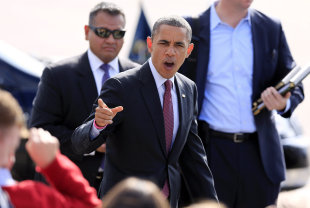SAN FRANCISCO (Reuters) - The firing of Citigroup stock analyst Mark Mahaney on Friday in the regulatory fallout from Facebook Inc's initial public offering was greeted with shock and dismay in Silicon Valley, where Mahaney was a well-known and well-liked figure.
"Pretty shocked," was the reaction of Jacob Funds Chief Executive Ryan Jacob, who described Mahaney as one of the most respected financial analysts covering the Internet industry.
"I'd put him at the top. If not at the top, then near the top," said Jacob. "He really knew what to look for."
In addition to firing Mahaney, Citigroup paid a $2 million fine to Massachusetts regulators to settle charges that the bank improperly disclosed research on Facebook ahead of its $16 billion IPO in May.
The settlement agreement said Mahaney failed to supervise a junior analyst who improperly shared Facebook research with the TechCrunch news website. (Settlement agreement: http://r.reuters.com/pyj63t)
The settlement agreement also outlined an incident in which Mahaney failed to get approval before responding to a journalist's questions about Google Inc -- and told a Citigroup compliance staffer that the conversation had not occurred -- even after being warned about unauthorized conversations with the media.
Mahaney declined to comment.
Mahaney got his start in the late 1990s, during the first dot-com boom where he worked at Morgan Stanley for Mary Meeker, one of the star analysts of the time. He went on to work at hedge fund Galleon Group before moving to Citigroup in 2005. Unlike most of his New York-based peers in the analyst world, Mahaney worked in San Francisco's financial district, close to the companies and personalities at the heart of the tech industry.
Earlier this month, Mahaney was named the top Internet analyst for the fifth straight year by Institutional Investor. The review cited fans of Mahaney who praised a "systematic" investment approach that allows him to avoid the "waffling" often evidenced by other analysts.
Mahaney's Buy rating on IAC/InteractiveCorp in April 2011, when the stock traded at $33.32, allowed investors to lock in a 51 percent gain before he downgraded the stock to a Hold at $50.31 a few months later, according to Institutional Investor.
But it wasn't only his stock picks that put him in good stead. He earned kudos for simply being a nice guy.
"He's a kind and thoughtful person and that's evident in the way he deals with people," said Jason Jones of Internet investment firm HighStep Capital. "He's very well liked on Wall Street because of that."
A CAUTIOUS VIEW ON FACEBOOK
Mahaney was only indirectly involved in the incident involving the Facebook research, according to the settlement agreement by Massachusetts regulators released on Friday. But the actions of the junior analyst who worked for him provide an unusual glimpse into the type of behind-the-scenes information trading that regulators are attempting to rein in.
While the Massachusetts regulators did not identify any of the individuals by name, Reuters has learned that the incident involved TechCrunch reporters Josh Constine and Kim-Mai Cutler as well as Citi junior analyst Eric Jacobs.
Jacobs, Constine and Cutler all did not respond to requests for comments.
In early May, shortly before Facebook's IPO, Jacobs sent an email to Cutler and Constine. Constine attended Stanford University at the same time as Jacobs.
Constine, who studied social networks such as Facebook and Twitter for his 2009 Master's degree in cybersociology at Stanford, had a close friendship with Jacobs, according to the settlement agreement.
"I am ramping up coverage on FB and thought you guys might like to see how the street is thinking about it (and our estimates)," Jacobs wrote in the email. The email included an "outline" that Jacobs said would eventually become the firm's 30-40 page initiation report on Facebook.
He also included a "Facebook One Pager" document, which contained confidential, non-public information that Citigroup obtained in order to help begin covering Facebook after the IPO.
Asked by Constine if the information could be published and attributed to an anonymous source, Jacobs responded that "my boss would eat me alive," the agreement said.
A spokeswoman for AOL Inc, which owns TechCrunch, declined to answer questions on the matter, saying only that "We are looking into the matter and have no comment at this time."
Ironically, Mahaney was one of a small group of analysts at the many banks underwriting Facebook's IPO who had cautious views of the richly valued offering. Mahaney initiated coverage of the company with a neutral rating.
Analysts at the top three underwriters on Facebook's IPO - Morgan Stanley, Goldman Sachs and J.P. Morgan - started the stock with overweight or buy recommendations.
Earlier this year, Reuters reported that Facebook had pre-briefed analysts for its underwriters ahead of its IPO, advising them to reduce their profit and revenue forecasts.
Facebook, whose stock was priced at $38 a share in the IPO, closed Friday's regular session at $21.94 and has traded as low as $17.55.
"There were tens of billions of dollars in losses based on hyping the name, a lack of skeptical information and misunderstanding the company," said Max Wolff, chief economist and senior analyst at research firm GreenCrest Capital.
"It's highly unfortunate and darkly ironic that one of the signature regulatory actions from this IPO so far involves punishing analysts for disseminating cautious information about Facebook," he added.
(Editing by Jonathan Weber, Mary Milliken and Lisa Shumaker)











